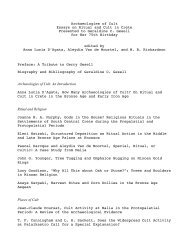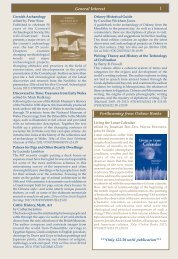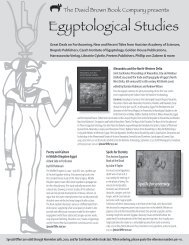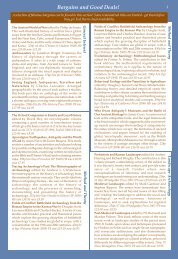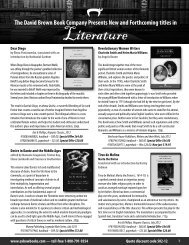Oxbow Spring 2013.pdf - Oxbow Books
Oxbow Spring 2013.pdf - Oxbow Books
Oxbow Spring 2013.pdf - Oxbow Books
Create successful ePaper yourself
Turn your PDF publications into a flip-book with our unique Google optimized e-Paper software.
The Principles of Arab Navigation<br />
William Facey (Editor); Anthony R. Constable (Editor)<br />
Throughout History, the Indian Ocean has been a zone of interaction between<br />
far-flung civilizations served by ports, and connected with the Mediterranean by<br />
the Gulf and Red Sea. Bringing together six scholars specializing in the maritime<br />
history and culture of the Arabs this book makes a new and vital contribution<br />
to the study of a nautical culture that has hitherto not received its due share<br />
of attention, and which is vital to an understanding of Indian Ocean history.<br />
Drawing on source material such as the guides by the renowned southern<br />
Arabian navigators Ahmad ibn Majid and Sulayman al-Mahri in the 15th and 16th<br />
centuries AD, as well as surviving logbooks of dhow captains in the early 20th, the<br />
volume covers the principal ideas, techniques, instruments and calculations used,<br />
deploying astronomy, geometry and mathematics to explain their methods.<br />
Islamic World<br />
9780957106017, £35.00, February 2013<br />
HB, full col throughout; 11 maps, Arabian Publishing Ltd<br />
Studies in the Islamic Arts of the Book<br />
Robert Hillenbrand (Author)<br />
The studies collected in this volume, some of them rather difficult to access, date<br />
mostly from the last fifteen years and focus primarily on Persian book painting<br />
of the 14th to the early 16th centuries. In this period, Iran dominated the art<br />
of book painting in the Islamic world. Two major leitmotifs are explored in this<br />
selection of essays. One is provided by the constantly varying interpretations<br />
of the Shahnama (The Book of Kings), the Persian national epic, and especially<br />
the tendency of painters to interpret this familiar text in terms of contemporary<br />
politics. The other is the interplay of text and image, which highlights the tendency<br />
of painters to strike out on their own and to leave the literal text progressively<br />
further behind while they develop plots and sub-plots of their own. These<br />
enquiries are set within the context of a concerted effort to explore in detail<br />
how Persian painters achieved their most spectacular visual effects.<br />
9781904597490, £150.00, Available Now<br />
HB, 556p, 258 illus., Pindar Press<br />
Libertinism in Medieval Muslim Society and Literature<br />
Zoltan Szombathy (Author)<br />
This book is about an aspect of medieval Arabic culture and literature known in<br />
Arabic as mujūn (roughly ‘libertinism, licentiousness, frivolity, indecency, profligacy,<br />
shamelessness, impertinence’, etc.), a concept that students of medieval Arabic<br />
texts may find rather hard to define but which is a recurrent term and a widespread<br />
phenomenon in medieval Arabic literature, and probably common in real life. The social<br />
implications and the background of mujūn are focussed on in an attempt to learn what<br />
the popularity of mujūn during a specific period of the medieval Middle East can tell us<br />
about the society and the culture that produced such works. It is a study of the society<br />
in which such literature flourished, of the values and norms of that society, and of the<br />
mājin (the man who does or writes mājin) rather than of mujūn in itself. The author uses<br />
many excepts from primary source texts to explore the nature, concepts and content<br />
of mujÙn. It provides a critical inventory of the varied motifs of mujūn in literature so<br />
as to define this elusive term by way of an accumulation of concrete examples.<br />
9780906094617, £45.00, 30 July 2013<br />
HB, 256p, 170 x 240 mm, Gibb Memorial Trust<br />
31



